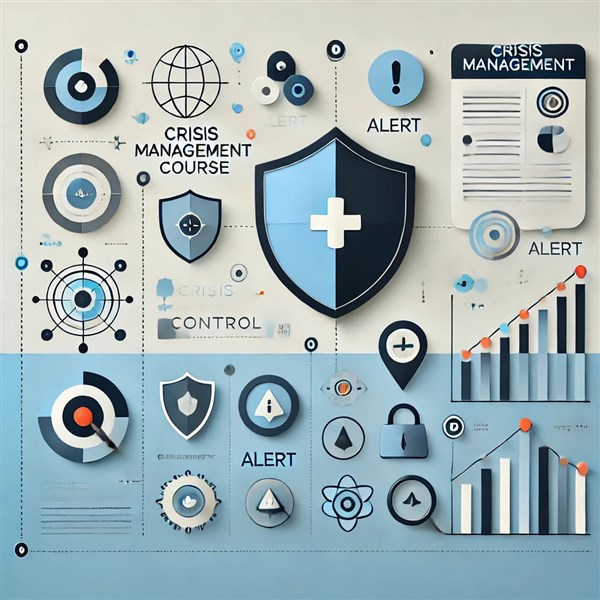
In today’s fast-paced and unpredictable business environment, organizations face various challenges that can arise unexpectedly, ranging from natural disasters to corporate scandals. The ability to effectively manage crises is crucial for the survival and reputation of any organization. Enrolling in a crisis management course can equip professionals with essential skills that enable them to navigate crises efficiently and emerge stronger. This blog will explore the key skills acquired in a crisis management course, focusing on risk assessment, communication strategies, and problem-solving techniques.
Understanding Crisis Management
Before diving into the skills acquired from a crisis management course, it is essential to understand what crisis management entails. Crisis management refers to the processes and strategies that organizations implement to prepare for, respond to, and recover from unexpected adverse events. Effective crisis management involves proactive planning, timely response, and continuous improvement to minimize the impact of crises.
Crisis management encompasses various disciplines, including public relations, risk management, and organizational behavior. The importance of crisis management cannot be overstated, as organizations that are ill-prepared for crises can face severe repercussions, including financial losses, reputational damage, and legal consequences.
Key Skills Acquired in a Crisis Management Course
1. Risk Assessment
One of the foundational skills taught in crisis management courses is risk assessment. Risk assessment involves identifying potential hazards, evaluating the likelihood of their occurrence, and determining their potential impact on the organization. Participants learn how to conduct comprehensive risk assessments by:
- Identifying Threats: Students are taught to recognize various types of threats, including environmental, operational, financial, and reputational risks. Understanding these threats is crucial for developing effective crisis management strategies.
- Analyzing Vulnerabilities: In addition to identifying threats, participants learn to analyze the organization’s vulnerabilities that may expose it to crises. This involves assessing internal processes, resources, and external factors that could contribute to a crisis.
- Prioritizing Risks: Once risks are identified, students learn how to prioritize them based on their likelihood and potential impact. This prioritization helps organizations allocate resources effectively and focus on the most pressing issues.
By mastering risk assessment, professionals can create informed crisis management plans that enhance organizational resilience.
2. Communication Strategies
Effective communication is critical during a crisis, as it helps maintain transparency, manage public perception, and mitigate the impact of the crisis. Crisis management courses emphasize the development of strong communication skills, including:
- Crisis Communication Plans: Students learn how to develop and implement crisis communication plans that outline communication protocols, key messages, and designated spokespersons. A well-prepared communication plan ensures timely and accurate information dissemination during a crisis.
- Stakeholder Engagement: Participants gain insights into identifying and engaging key stakeholders, including employees, customers, investors, and the media. Understanding the concerns of different stakeholders enables organizations to tailor their communication strategies accordingly.
- Media Relations: Crisis management courses often cover media relations, teaching participants how to interact with journalists, respond to inquiries, and manage media coverage during crises. Effective media relations can help shape public perception and maintain credibility.
- Message Crafting: Students learn how to craft clear, concise, and empathetic messages that resonate with audiences. The ability to communicate with empathy is especially important during crises, as it helps build trust and credibility.
3. Problem-Solving Techniques
Crisis situations require quick thinking and effective problem-solving skills. A crisis management course equips participants with problem-solving techniques that allow them to address challenges effectively. Key aspects of problem-solving taught in these courses include:
- Critical Thinking: Participants develop critical thinking skills that enable them to analyze complex situations, evaluate options, and make informed decisions. Critical thinking is essential for identifying the root causes of crises and developing effective solutions.
- Creative Solutions: Crisis management often involves unexpected challenges that require innovative solutions. Students are encouraged to think creatively and explore unconventional approaches to problem-solving, fostering adaptability and flexibility.
- Collaboration and Teamwork: Effective crisis management often requires collaboration across departments and teams. Courses emphasize the importance of teamwork and collective problem-solving, enabling participants to leverage diverse perspectives and expertise.
- Decision-Making Under Pressure: Crises often demand rapid decision-making. Students learn techniques for making decisions under pressure while considering the potential consequences of their actions. This skill is vital for effective crisis response.
4. Leadership Skills
Crisis management courses also focus on developing leadership skills essential for guiding teams through challenging situations. Key leadership skills covered include:
- Emotional Intelligence: Understanding and managing emotions—both one’s own and those of others—is crucial during crises. Participants learn to demonstrate empathy, resilience, and composure, which are essential for effective leadership in high-stress environments.
- Conflict Resolution: Crises can lead to increased tension and conflict within teams. Students learn conflict resolution techniques that help navigate disagreements, foster collaboration, and maintain a positive team dynamic.
- Change Management: Crises often necessitate change within organizations. Participants learn how to manage change effectively, ensuring that teams remain focused and motivated despite uncertainty.
5. Strategic Planning
Crisis management courses emphasize the importance of strategic planning in preventing and mitigating crises. Participants learn how to:
- Develop Crisis Management Plans: Students gain practical skills in creating comprehensive crisis management plans that outline response protocols, communication strategies, and recovery processes.
- Conduct Drills and Simulations: Practicing crisis response through drills and simulations allows participants to refine their skills and prepare for real-life scenarios. These exercises enhance team coordination and ensure that everyone understands their roles during a crisis.
- Evaluate and Improve Plans: After a crisis, it is essential to evaluate the effectiveness of the response. Students learn techniques for conducting post-crisis evaluations, identifying areas for improvement, and making necessary adjustments to crisis management plans.
Conclusion
In an increasingly complex and uncertain world, crisis management has become a critical competency for professionals across various industries. Enrolling in a crisis management course equips individuals with essential skills that empower them to navigate crises effectively, safeguard their organizations, and enhance their career prospects.
The skills acquired through crisis management training—such as risk assessment, communication strategies, problem-solving techniques, leadership abilities, and strategic planning—are invaluable assets that contribute to personal and professional growth. As crises continue to evolve in nature and complexity, investing in crisis management education is a proactive step toward building resilience and success in today’s dynamic environment.
In conclusion, a comprehensive crisis management certification is an essential asset in today's corporate world. It not only enhances your employability but also prepares you to handle any crisis effectively. So, enroll in a crisis management certification online with Koenig Solutions today and take a step towards a successful career.







COMMENT